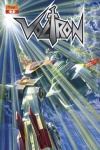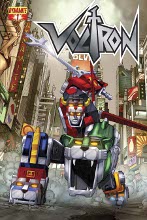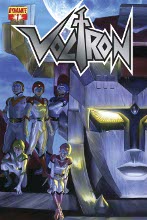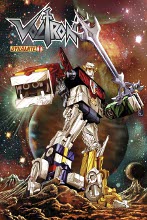 We interviewed Brandon Thomas, the writer of the new Dynamite Voltron series, to find out his approach to handling this iconic property.
We interviewed Brandon Thomas, the writer of the new Dynamite Voltron series, to find out his approach to handling this iconic property. Please introduce yourself to our readers, in terms of your comics career and background.
I broke into the business in 2003, officially. I had been writing a regular column on Silverbulletcomicbooks.com, which is now Comicsbulletin.com. I started writing a column in 2001 called Ambidextrous, and I started it as a way to break into the industry as a writer and to also kind of chronicle the process as it went along. Through that column I developed a couple of contacts, most notably Mark Millar. He was very, very influential for me in the beginning and helped me get my foot in the door a couple of places. One of those places was with Rob Liefeld. Millar did a Youngblood: Bloodsport miniseries for Rob; at the same time Rob wanted to release a companion piece to that series that would be the past and the future of Youngblood in one shot. He hired me to script over a Kurt Busiek plot for his Youngblood Genesis series that had been solicited a few times over the years but hadn’t really come out. That was my first published work. It premiered at San Diego Comic-Con in 2003. Since then, over the years I’ve had scattered releases. I did an issue of Spider-Man Unlimited, a Fantastic Four Tales mini for Marvel; I did a fill-in issue for Robin a couple years ago; and most recently my first creator-owned project, The Many Adventures of Miranda Mercury, just released through Archaia.
Did you have any past connection to Voltron before you got this assignment?
Just as a fan! I am an eighties kid, so I grew up with Voltron and Thundercats and G.I. Joe and Transformers – you know, I was about five or six when most of that stuff was coming out. I was pretty obsessed with it, like a lot of kids my age. So that was my experience with the property, even before I ended up pitching it to Dynamite.
There is obviously a 30 year history with this property, and fans of the anime, the original English series, and the new series – which reader are you writing for?
The time period that we’re focusing on is, I don’t want to say the original, but probably the most popular incarnation of Voltron, which is Lion Force. That is the one that I personally am most familiar with, and a lot of people that are around my age are probably more familiar with the Lion Force characters and story line.
We’re definitely aiming the series at people who have a pre-established connection to the Voltron mythos, to the main Voltron story. But in addition to that, we also believe that people who have no idea what Voltron is or only have a very basic understanding of how the concept works can very easily plug into the series and get on the same page quickly. I compare our approach to what J.J. Abrams did with the recent Star Trek movie, where it was a back-to-basics approach to the properties.
But for people who are really obsessed with Voltron and know everything about it, there will be little Easter eggs and little characters and things that are introduced that I think people will instantly recognize from certain episodes and certain moments.
I think it will be a book that will play well to anyone who loves science fiction, and space, and giant robots. I think we’ll be able to touch on a lot of different demo with the book.
It sounds like you’re going back to the first season of material that was produced in the 80s. As you probably know that was sort of cobbled together from a Japanese series, Beast King GoLion. The second season they started getting into the other anime. Do you have any familiarity with the original anime or are you basing your work on the American series?
Both, actually. Initially my familiarity was with the Americanized version of Voltron, but the people at Classic Media sent me the complete GoLion set, so I’ve been able to watch both versions. I’ve been able to compare different things between the two. One thing that is very obvious, very quickly, is that the original GoLion series is almost frighteningly violent. When you watch it, you can really understand why they made a few of the changes that they did when they Americanized the show. But I do have a familiarity with both series now. And there will be some things from both series that will be showing up, both the American version and the original GoLion series.
We’ve never seen the anime but we do know they were darker, the world was destroyed in a nuclear war…
Yes, it was a lot more violent. For instance, one of the things that I thought was funny, they had this very long sequence in the very first episode with how King Zarkon had all these slaves he would capture from the worlds that they had destroyed and annexed. He would make them fight in these gladiator arenas. When they would kill each other or when they would lose their fights, the Zarkon forces would actually cook the slaves and turn them into a “slave soup” that Zarkon and his troops would then eat. It’s little things like that that make you understand immediately why they changed it.
One thing that is a point of focus for GoLion is the fate of Earth. The Americanized version takes placed on another planet that is a lot like Earth, but it’s different. One little thing that I can give away at this point is that we will be from Voltron on Earth. With the first issue I gave myself a goal: every four or five pages I wanted to give people something that they hadn’t seen from Voltron in the past. And one of those things is definitely a fully functioning Voltron on Earth. I think that is something that people will really dig.
How about the past comics – have you looked at those at all?
No. I actually missed a lot of that stuff, and Dynamite encouraged me not to seek that out, just so I didn’t feel like it had to be a continuation of the past comic-based incarnations of Voltron. I’m essentially taking the first season of the original American version of Voltron and GoLion and using that as my canon. I’m completely unfamiliar with the stuff that Devil’s Due put out. But I heard that it was good stuff that people remember fondly, so hopefully people who were checking out those books will see this one and get excited.
They canceled after awhile; sales weren’t going the way they wanted. Do you think the Voltron property is going to have broader appeal now? We know there’s the movie run-up now that’s got some people excited.
There’s a movie run-up and there’s a new cartoon. I think the idea right now is that Voltron is being re-introduced to all of these new audiences. When you combine that with the pre-existing audience for the character, I think Dynamite really felt that if they could come out with the right take, with the right approach, that this will be something that will definitely find a market out there. And obviously Dynamite has had great success with a lot of licensed books over the years and they feel they’ve got a really good infrastructure in place.
Having Alex Ross involved is a tremendous asset. His paintings for the first few covers are fantastic.
I think this is a good time for the character to be coming back into comics. And I think a lot of people know Voltron, or they know of Voltron. And I think there are some things that make this property work fantastic as a comic book. One thing is that there are really no constraints on the property. Any Voltron movie that comes along in the next couple of years, it’s going to be a challenge to make sure that that movie does not cost $250 million dollars to create. In comics, we really have no limit, so I can do a $300 million dollar Voltron movie every issue. And that’s really what we’re aiming for; we’re aiming to raise the stakes to really intensify the visuals.
We’re really aiming to give people some things from Voltron that they’ve never seen before: things that are still Voltron, but are those interpretations that you get when you have people that grew up as kids obsessed with Voltron and cartoons just like it, and now they’re the ones that have the opportunity to contribute to the larger myth. A lot of the guys at Classic Media are just like me: they were big fans of the show growing up and now they get to help contribute to the larger story of the characters.
Are you working with World Events at all or have they given you any guidance in terms of trying to make the comic story lines prepare in any way for the movie story line?
Oh no, not at all. Not at all. We’re not coordinating with the work they’re doing on the cartoon either. I do have the series bible, and a few of the things that were in my master proposal dovetail or are very similar to a few things that they’ve also planned for the Voltron Force cartoon down the line. But they really wanted to let Dynamite’s version of Voltron be its own separate entity. They have a relationship with Viz; Viz is putting out comics or graphic novels based on the new cartoon, Voltron Force. So they wanted Dynamite’s version to be completely divorced from all of that. The kind of guidelines that we got over and over again were that this is essentially “Ultimate” Voltron. This is stripping the concept down to the very basic elements and punching up a few things that we thought were touched on in the original stories.
One of the things I was adamant about was that I really wanted Keith and the space explorers to be a very highly trained and very effective fighting force, even when they weren’t in the Lions, because I really wanted to play up this whole idea that the space explorers are extremely dangerous on their own, so when they get into the lions they are even more dangerous. I think it really plays up that aspect of the characters. That was one of a few things I was pretty insistent on. I thought it was something that would make it a little different and more modern for some of the audience.
Are you writing in a story arc of a particular length?
The first story arc is going to be five issues. We will see how the book does, and I’m fully prepared to do more. When I turned in my initial proposal I outlined the first 20 or 21 issues. I’m very prepared!
We’re really excited about the series and we hope people get into it, because if they do, there’s a lot more to come. This first story line is going to be a bit of a re-introduction, getting people used to the language, and the perspective of this particular take on Voltron. If they want more, we’re ready to give them more. I have a very long and I think interesting story arc to tell.
I’m almost done with the scripts for the very first arc, which is called, “The Sixth Pilot.” We’ll just wait to see what the numbers are, and we’ll move on from there.
To wrap up, as you may know, a lot of our audience is retailers, some librarians, buyers at the trade level. Do you have anything else that you want them to know about the book?
The book is definitely going to be aimed at a teen reader. For anyone who is familiar with the Miranda Mercury hardcover I put out recently through Archaia, it will be very much that same type of tone and flavor. It’s not going to be overly violent. I think it’s going to be something that kids and teens can read and enjoy. It’s not something that’s too mature or too intense. But having said that, I think it’s really going to be a fun take that really takes these characters to the next level. I think it will be perfect for fans of science fiction books, of action adventure, character dramas. There are a lot of particular beats that we’re looking to hit. And again, the thing that I would reference is the recent Star Trek movies, where it’s taking everything back to basics, winking at the established fans in ways that only they would really notice. But we think it’s a very entry level story for people that are coming in to Voltron, and for people who have left Voltron behind and don’t quite remember all of the precise details. They know the basics of how the story and the characters work. There will be things in the series that people haven’t seen in a Voltron before. I think that will be a lot of fun.





